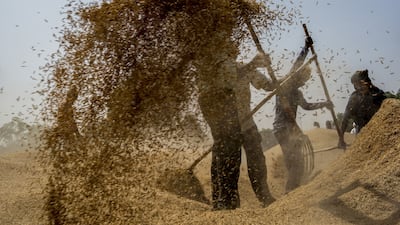It has famously been said that an army marches on its stomach. This is doubly true for an entire country. A critical job for governments – perhaps the top priority alongside national defence and maintaining law and order – is to ensure the population enjoys access to an affordable supply of basic foodstuffs.
We live in a world where modern agriculture and sophisticated supply chains mean many societies – but, sadly, not all – have access to abundant food. This system of production and distribution, however, is fragile – vulnerable to acute shocks, such as war, or unfolding long-term crises like climate change.
When it comes to a staple food like rice, upon which more than three billion people worldwide depend, complacency is simply not an option.
A recent decision by the UAE to suspend its sale of rice overseas for four months reflects a clear need to protect supplies at home but also indicates how food security has become embedded in the country’s domestic and foreign policies.
The UAE’s move comes a week after India, the world's leading rice exporter, imposed a ban on some overseas sales of the grain to ensure domestic supplies and to fight rising prices in the local market.
The Emirates, like other countries in the Gulf that import most of their food, prioritises ensuring shelves are stocked and warehouses remain full. This means food security has become a policy priority for a government that is ahead of the curve on making sure its citizens and residents can have confidence in readily available supplies.
This prioritisation of food security has been taking place for some years. The country’s National Food Security Strategy 2051 has five strategic goals to increase domestic production, find alternative supply chains and reduce food waste. A food loss and waste initiative called Ne'ma helps the public and private sectors to cut waste and boost responsible consumption.

And agri-tech has grown exponentially in the country. In February, The National visited farmers and engineers in Sharjah involved in a high-tech project to grow wheat in the emirate.
These are just a few examples of the UAE’s proactive work on food security but they reveal a forward-thinking approach, one that seems prescient given the current threats to global supply chains and the vagaries of international markets. Concerns about the supply of rice globally have their roots in the collapse of the Russia-Ukraine grain deal, as well as the onset of the weather phenomenon El Nino.
Early monsoon rains in India meant farmers could not plant summer crops such as corn, soybeans – and rice – on time, leading to serious consequences for supplies.
Not every country is lucky enough to have the resources available for contingency planning. Countries that depend upon rice imports and lack sustainable alternatives are particularly vulnerable when suppliers like India – which is responsible for more than 40 per cent of all global rice shipments – restricts exports.
This is why continued research into creating sustainable food supplies is more important than ever. One example of this important work is the FoodTech Challenge, an international competition launched under the patronage of Sheikh Mohammed bin Rashid, Vice President and Ruler of Dubai, that “aims to develop innovative technology-based solutions to enhance the resiliency of the food supply chain in an arid and marginal environment”.
Encouraging this kind of innovation is important, given the interconnected nature of our modern world and the co-operation needed to successfully produce, ship, store and distribute food. Working with as many countries as possible to secure vital supply chains benefits everyone. A world that can eat – even when there are bumps in the road – is a stable world.


